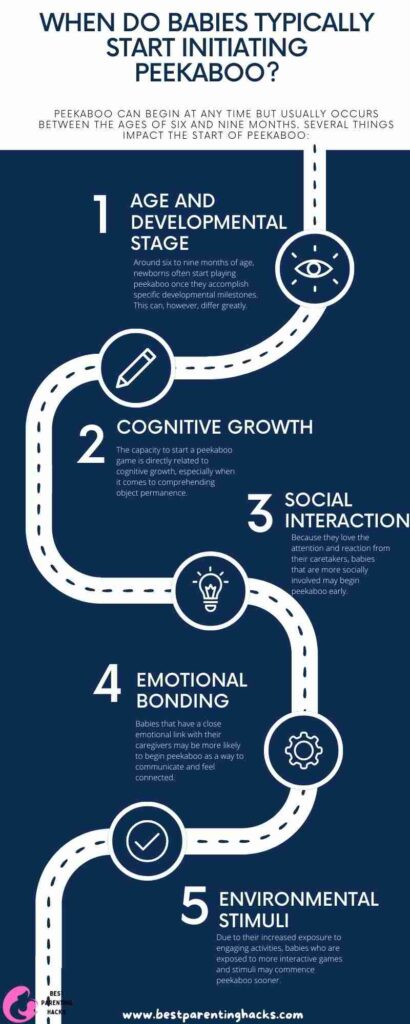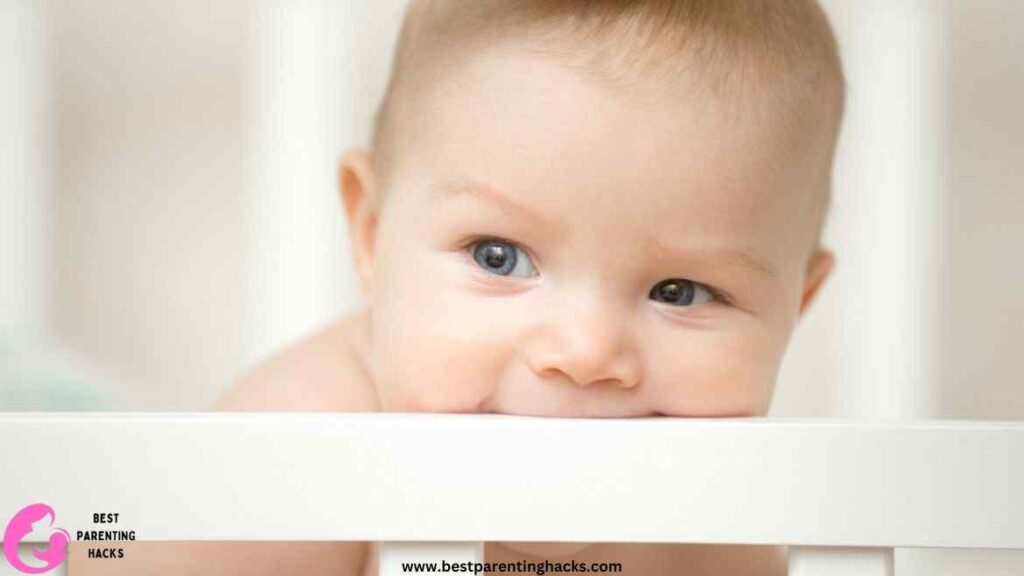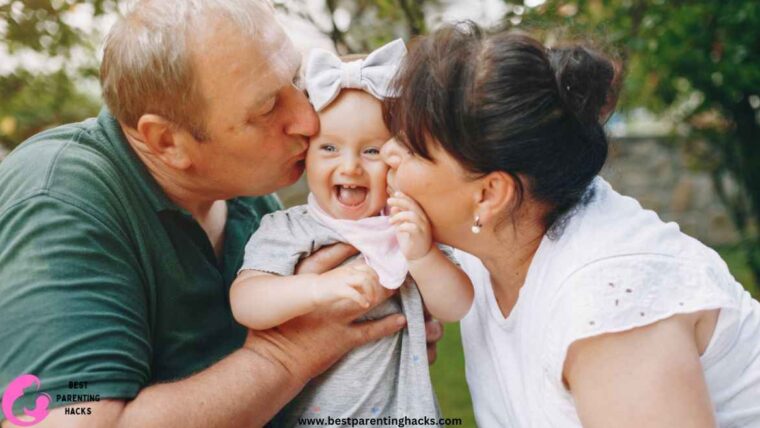Table of Contents
A game as old as time itself, peekaboo is woven intricately into the fabric of childhood memories. An infant and a caregiver engage in a basic yet meaningful game of hide-and-seek that is frequently accompanied by joy and laughing. The position of the game is very significant in early childhood development as it goes beyond countries and generations. Beyond being simply, a pleasurable means of passing time, this game is an integral part of babies’ emotional and cognitive growth. I still recall my first peek-a-boo game with my niece. Her eyes glowed with delight and astonishment; then, we became closer and her trip into the realm of social interaction and cognitive comprehension began.
When addressing the question “When Baby Initiates Peekaboo?” in the title, it’s critical to acknowledge this as a noteworthy developmental milestone. It means that the baby has reached some level of social and cognitive development. More than just another game, it’s about how much the kid understands object permanence which means that things are still there even not seen by anybody else but him/her. A newborn is starting to understand this notion when they start playing peekaboo, which is an important cognitive jump. This is an important milestone for any parent or caregiver who can therefore celebrate it.

When Do Babies Typically Start Initiating Peekaboo?
Peekaboo can begin at any time but usually occurs between the ages of six and nine months. This beginning signifies the infants’ growing understanding of their surroundings. It brings delight to every parent. Several things impact the start of peekaboo:
1. Age and Developmental Stage: Around six to nine months of age, newborns often start playing peekaboo once they accomplish specific developmental milestones. This can, however, differ greatly.
2. Cognitive Growth: The capacity to start a peekaboo game is directly related to cognitive growth, especially when it comes to comprehending object permanence.
3. Social Interaction: Because they love the attention and reaction from their caretakers, babies that are more socially involved may begin peekaboo early.
4. Emotional Bonding: Babies that have a close emotional link with their caregivers may be more likely to begin peekaboo as a way to communicate and feel connected.
5. Environmental Stimuli: Due to their increased exposure to engaging activities, babies who are exposed to more interactive games and stimuli may commence peekaboo sooner.
You Might Also Like to Read: What to Do If Baby Hates Getting Dressed After Bath?
Understanding Peekaboo: More Than Just a Game
Peekaboo has been a game among people of all ages for years. It may seem like an enjoyable game. Its influence on a child’s development shouldn’t be underestimated. Among other things, this game helps improve cognition, especially concerning understanding object permanence—the concept that some things exist when they are hidden from sight. Additionally, it is essential for social development since it teaches infants how to connect and communicate. As a parent, I can attest to the fact that peekaboo can make a baby’s day by delivering grins and laughter that make the world go round.
Peekaboo is played in four main stages, each of which has a developmental significance:
1. Anticipation: By recognizing the pattern of concealing and reappearing, the infant learns to anticipate what will happen next. This expectation creates mental circuits.
2. Surprise and Delight: Peekaboo’s reveal moment is brimming with both surprise and joy. Happiness and emotional connection depend on this emotional reaction.
3. Social Interaction: The game Peekaboo involves two players. It prepares the infant for future social interactions by teaching them social cues and how to take turns.
4. Understanding of Object Permanence: Peekaboo’s contribution to the development of object permanence may be its most important feature. The infant discovers that things exist even while they are invisible to them, such as the face of a caregiver.
You Might Also Like to Read: How Long Can a Baby Stay in a Mama Roo Swing?

The Joy and Surprises of Peekaboo
Peekaboo is full of surprises and joys. This type of interaction brings joy and laughter to both the caregiver and the baby. A baby’s eyes light up with genuine ecstasy when they finally “find” their caregiver again. This game is an ode to exploration and connection—a straightforward but meaningful exchange that fortifies relationships and spreads happiness.
Peekaboo delight is summed up in five essential elements:
1. Emotional Connection: Peekaboo helps to create a happy, joyful, and strong emotional link between the infant and the caregiver.
2. Surprise Element: The peekaboo element of surprise awakens the baby’s senses and creates a feeling of excitement and wonder.
3. Cognitive Development: Peekaboo plays a major role in the development of cognitive skills by encouraging the knowledge of object permanence.
4. Social Skills: Babies learn the fundamentals of communication, turn-taking, and social engagement through peekaboo.
5. Language Skills: The game’s repetitious elements, including terms like “peekaboo,” aid in the early phases of language acquisition.

Challenges and Solutions in Peekaboo Play
Even while peekaboo is usually enjoyable, there are times when it might be difficult. Certain babies could react less well or perhaps show fear. Nonetheless, with perseverance and flexibility, these difficulties may be solved.
There are four main ways to overcome the problems with peekaboo play:
1. Adapting the Game: You may adjust the peekaboo game to make it less scary or uninteresting for a newborn. The game can be more engaging by employing new items or revealing things more slowly.
2. Observing Baby’s Cues: Keeping a watchful eye on the baby’s responses might reveal tips on how to improve their enjoyment of the game.
3. Gradual Introduction: If your baby is apprehensive at first, giving the game to them little by little can help them get used to it and eventually like it.
4. Consistency and Patience: Playing peekaboo with your infant regularly and exercising patience when they react can ultimately result in a happy encounter.

The Long-Term Benefits of Peekaboo
Peekaboo is good for a child’s growth in the long run; it’s not merely a short-term distraction. These advantages can be observed in many facets of development and education.
Peekaboo’s long-term advantages are noticeable in five main areas:
1. Cognitive Development: By teaching students about object permanence, Peekaboo enhances their ability to think critically and solve problems.
2. Social Skills: By teaching infants communication and empathy, this game prepares them for future social interactions.
3. Emotional Health: Peekaboo brings joy and laughter, which enhance a baby’s emotional health and happiness.
4. Language Skills: Through response and repetition, Peekaboo promotes the early development of language.
5. Bonding and Security: The game helps to build trust and a sense of security between the infant and the caregiver.

Conclusion
Playing peekaboo with a child is more than a game – it holds significant value in a child’s development fostering joy, learning, and social connections. I’ve seen firsthand as a parent how profoundly peekaboo affects my child’s development. It’s a game that strengthens our bond, makes our house laugh a lot, and builds a solid future for my child. A baby’s first peekaboo is a big deal since it signals the beginning of the development of cognitive, social, and emotional abilities. This game serves as a form of love and learning that goes beyond the limits of time and diverse societies. Caretakers should appreciate and enjoy these hide-and-seek moments because they develop a child and maintain relationships that come after those joyful interactions, not just for fun.
FAQs
1. When do most infants begin to play peekaboo?
Most newborns start between six and nine months, yet each baby’s development is unique.
2. What developmental advantages can peekaboo provide my infant?
Playing peekaboo can enhance skills, communication and cognitive growth in understanding object permanence.
3. Can peekaboo support the language development of my infant?
Indeed, playing the game and repeatedly hearing words like “peekaboo” aids with early language learning and comprehension.
4. What should I do if my child shows no interest in peekaboo?
Experiment with different game versions or introduce the game more gradually. Making the game more interesting can be aided by paying attention to your baby’s indications.
5. How can I pique my baby’s interest in peekaboo?
To retain excitement and interest, this game uses various items, expressive faces as well as different speeds of motion.
6. Does peekaboo work effectively for older toddlers?
By playing peekaboo helps in developing cognitive ability among babies when they start adapting to their skills.
7. Can peekaboo assist my baby’s bonding process?
Yes, peekaboo is a great technique to deepen your bond and emotional connection with your child.




